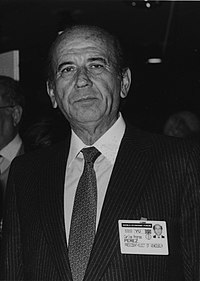Second Presidency of Carlos Andrés Pérez
| Carlos Andrés Pérez | |
|---|---|

Carlos Andrés Pérez in 1989
|
|
| 58th President of Venezuela | |
|
In office February 2, 1989 – May 20, 1993 |
|
| Preceded by | Jaime Lusinchi |
| Succeeded by | Octavio Lepage (Acting) |
| Personal details | |
| Born |
27 October 1922 Rubio, Táchira, Venezuela |
| Died | 25 December 2010 (aged 88) Miami, Florida, United States |
The second presidency of Carlos Andrés Pérez (1989–93) saw an economic crisis, a major riot in which hundreds were killed by security forces (Caracazo, 1989), two coup attempts in 1992, and the 1993 impeachment of "CAP" for corruption. He was the first Venezuelan President to be impeached.
For the 1988 presidential election Democratic Action (AD) President Jaime Lusinchi backed Octavio Lepage as AD candidate, but in a primary election the party chose Carlos Andrés Pérez (previously president from 1974 to 1979).
In February 1989, at the beginning of his second term as President, he accepted an International Monetary Fund proposal known as the Washington consensus. In return for accepting this proposal, the International Monetary Fund offered Venezuela a loan for 4.5 billion US dollars. This cooperation with the IMF came about weeks after his victory in the 1988 presidential election, and a populist, anti-neoliberal campaign during which he described the IMF as "a neutron bomb that killed people, but left buildings standing" and said that World Bank economists were "genocide workers in the pay of economic totalitarianism". Poor economic conditions led to attempts to revolutionize the political and economic structure of Venezuela, but the implementation of the neoliberal reforms (and in particular the liberalisation of petrol prices, which caused an immediate increase in the cost of petrol to consumers and rises in fares on public transport) resulted in massive popular protests in Caracas, the capital. Carlos Andrés Pérez crushed the protest with the national guard, causing a large number of deaths—estimates range from 500 to 3000, and resulted in the declaration of a state of emergency. The protest is now referred to as the Caracazo.
...
Wikipedia
